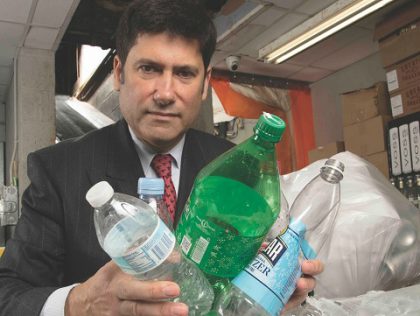 Fighting with plastics wastes is going to be more serious by authorities in the world and all have forgotten that it is not the nature of plastics that is threatening our planet, rather it is lack of consumers’ culture that results in throwing away the plastics products. Plastics can’t be eliminated from the humankind’s life. Living without plastics is no more possible. The people on earth should learn more in order to keep the wastes on track. The following article is published by “PN Daily” and you will be referred to their website at the end.
Fighting with plastics wastes is going to be more serious by authorities in the world and all have forgotten that it is not the nature of plastics that is threatening our planet, rather it is lack of consumers’ culture that results in throwing away the plastics products. Plastics can’t be eliminated from the humankind’s life. Living without plastics is no more possible. The people on earth should learn more in order to keep the wastes on track. The following article is published by “PN Daily” and you will be referred to their website at the end.
Environmentalist Susan Collins was delighted when she learned New York is looking to expand its nickel-deposit law to include plastic and glass bottles containing juice, coffee and tea concoctions, plus sports and energy drinks. A redemption reward would ensure more of the materials are reused, she said.
“Coca-Cola, Pepsi and other big beverage companies have committed to using more recycled plastic in their bottles, but they need an adequate supply, and New York would be an important source,” said Collins, president of the Container Recycling Institute, a nonprofit advocacy group. “You’re talking about billions fewer bottles ending up in landfills or oceans.”
As a bonus, recycled materials from the city are of unusually high quality. That’s because plastic, glass, metal and paper products must be separated from regular trash before they’re carted away, Collins noted. The result is less contamination — which makes it easier to find buyers of the raw materials.
“It’s a big change,” Collins said of the expanded bottle-deposit bill that Gov. Andrew Cuomo, a Democrat, introduced in January as part of his budget proposal. “New York is to be commended for taking this step.”
It’s fair to say Avi Kaner doesn’t share her enthusiasm. The co-owner of the Morton Williams supermarket chain isn’t relishing the thought of folks bringing in a lot more bottles and cans to his West 57th Street location in New York, where he spent $10 million to turn the ground floor and basement into retail space.
“We keep this place nice and clean, in fitting with the neighborhood,” said Kaner, whose store is across the street from One57, a Billionaires Row apartment tower. “The last thing we need is people bringing more of their garbage here.”
At Kaner’s store, people bringing bottles and cans to redeem the deposit wait in the checkout line with other customers. Their returns — a maximum of 240 items per person daily — are stored near a street-facing window before they’re stashed in the basement for up to two weeks. It’s not an optimal use of space in a store where rent is $200 per square foot and every inch of shelving counts. Moreover, Kaner’s cost to pay the workers who handle returnables soared as the minimum wage jumped from $7.25 per hour six years ago to its current $15.
“Anything that can be done to prevent waste and help the planet is a good thing,” Kaner said. “But the economics of recycling don’t work for a business like ours.”
A battle pitting the likes of Collins against Kaner is playing out in the state capital of Albany, N.Y. Cuomo says expanding the number of containers covered by the state’s bottle- deposit law “will reduce litter in our communities, protect our water and create a cleaner and greener New York for all.” But such measures tend to face opposition in the state Legislature, which is why the state’s recycling efforts have grown in fits and starts during the past 40 years.
More than 5 billion bottles are redeemed for deposit every year in New York. Industry experts say adding those for orange juice, energy drinks and the rest will add about 2 billion. That would total $350 million worth of redemptions, plus $250 million in fees for retailers and redemption centers, which are paid a state-mandated handling fee of 3.5 cents per container by beverage distributors. (Some are pushing Albany to increase that fee to keep pace with rising labor costs.)
To read more on nickel-deposit “Click Here”













